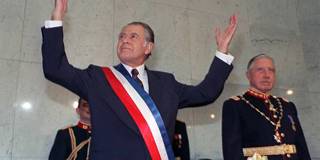Latin America’s Foxy Leaders
A new kind of Latin American leader – moderate, intellectually humble, and prone to gradualism – has been in ascendance since the 1990s. The elder statesman of this generation of pragmatists, Patricio Aylwin, who led Chile from dictatorship to democracy a quarter-century ago, died last week.
SANTIAGO – “Every country gets the leaders it deserves,” the French counter-revolutionary Joseph de Maistre quipped. He was wrong. The countries of Latin America did not deserve the blustering demagogues and iron-fisted generals who, until recently, often occupied the seats of government.
A look at Venezuela or Nicaragua reminds us that the demagogues and the populists are not yet gone. But a new kind of leader – moderate, intellectually humble, and prone to gradualism – has been in ascendance since the 1990s. This is the kind of leadership Latin America does indeed deserve.
The elder statesman of this generation of pragmatists died last week. In a continent of loud-mouthed leaders, Patricio Aylwin, who led Chile from dictatorship to democracy in 1990, was an oddity: a soft-spoken professor whose great love was the study of the more abstruse aspects of administrative law. His legacy sheds light on what moderate leaders in Latin America must do if they are to succeed.



SANTIAGO – “Every country gets the leaders it deserves,” the French counter-revolutionary Joseph de Maistre quipped. He was wrong. The countries of Latin America did not deserve the blustering demagogues and iron-fisted generals who, until recently, often occupied the seats of government.
A look at Venezuela or Nicaragua reminds us that the demagogues and the populists are not yet gone. But a new kind of leader – moderate, intellectually humble, and prone to gradualism – has been in ascendance since the 1990s. This is the kind of leadership Latin America does indeed deserve.
The elder statesman of this generation of pragmatists died last week. In a continent of loud-mouthed leaders, Patricio Aylwin, who led Chile from dictatorship to democracy in 1990, was an oddity: a soft-spoken professor whose great love was the study of the more abstruse aspects of administrative law. His legacy sheds light on what moderate leaders in Latin America must do if they are to succeed.